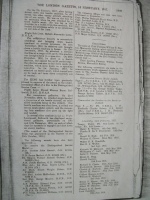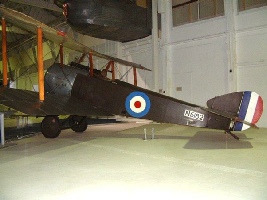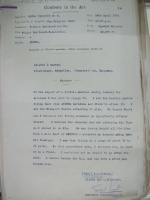By the following February, he had four victories to his credit and was  awarded the Distinguished Service Cross (DSC) for "conspicuous bravery in successfully attacking and bringing down hostile machines".
awarded the Distinguished Service Cross (DSC) for "conspicuous bravery in successfully attacking and bringing down hostile machines".
In one action on 4 December, Little and Goble "fought like mad" against a large formation of German fighters, each claiming a Halberstadt;  Little did not return to base with Goble and was thought lost, but had only landed near Allied lines to clear his jammed gun before taking off again to continue the fight.
Little did not return to base with Goble and was thought lost, but had only landed near Allied lines to clear his jammed gun before taking off again to continue the fight.
Remarkably, the Sopwith Pup N5182 (Lady Maud) in which he claimed his first four victories is displayed at the Royal Air Force Museum in Hendon, London. A former Royal Navy pilot acquired Lady Maud in pieces from a French hangar and spent a decade restoring it. It was rebuilt to flying standard and, in October 1976, led a flypast to commemorate the Squadron's Diamond Jubilee, before going on permanent display at the Museum.
On 1 February 1917, Naval Eight handed over its Pups to No 3 (Naval) Squadron who took their place in the line with the RFC, while Naval Eight's personnel went back to Dunkirk to reform with a more formidable fighting machine, the Sopwith Triplane. From this point on, Little’s successes multiplied, and the fighting which followed the Arras offensive of 1917 confirmed him as one of the war’s great aces.
point on, Little’s successes multiplied, and the fighting which followed the Arras offensive of 1917 confirmed him as one of the war’s great aces.
On 24 April 1917, he attacked a DFW CV (Aviatik), put a bullet through its oil tank, and then followed its glide down to a field behind the Allied lines, to force it to land, to claim it as captured, and personally take its crew prisoner at gunpoint. The German made a perfect landing but Little's triplane turned over on landing and the German pilot (who had been a Rhodes scholar at Oxford before the war) had to help his notional captor out of the upturned Sopwith, remarking that:"It looks as if I have brought you down, not you me, doesn't it?"
In an example of chivalry without equivalent, he took his two prisoners to dinner, where they were impressed by the available fare: meat, potatoes and especially sugar. Alec proudly reported that they had told him that Lieutenant Leefe Robinson was still alive. Robinson had won a VC and immense popularity for being the first to shoot down an enemy zeppelin bomber over Britain. He had been captured and now Little knew he was alive – though not for long.



Robert Alexander Little -






